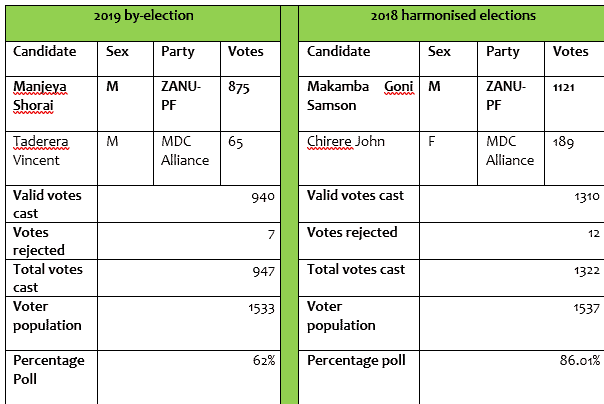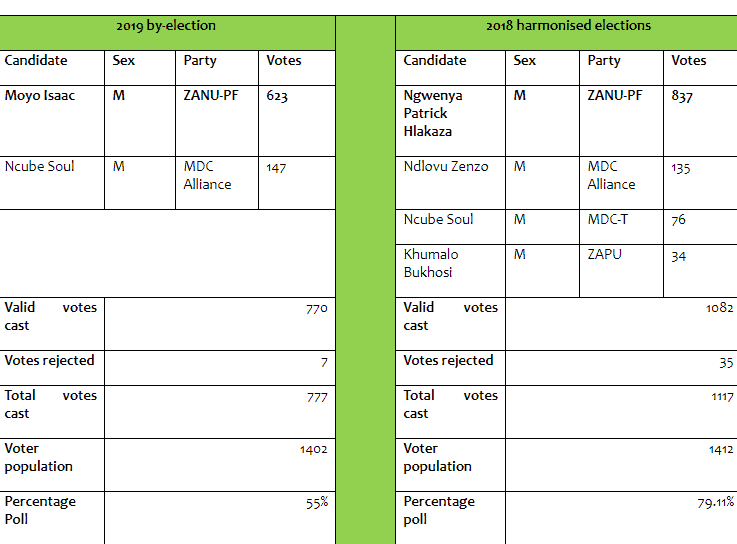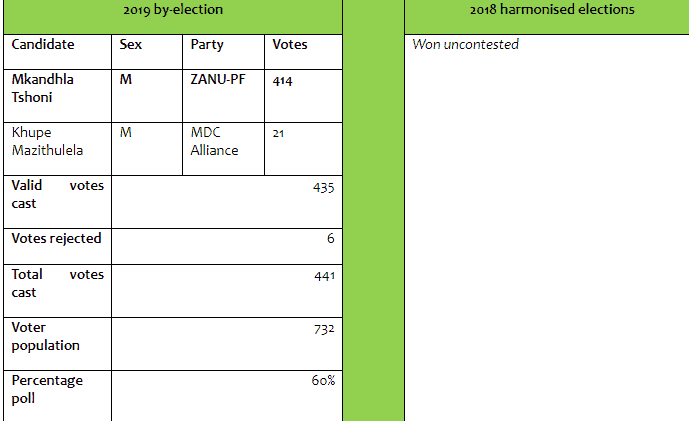The Zimbabwe Election Support Network (ZESN) deployed static observers to track electoral developments in the three local authority by-elections conducted by the Zimbabwe Electoral Commission (ZEC) on 9 November 2019. The Tsholotsho by-elections were conducted following the expulsion of former ZANU-PF Councillors, Ngwenya Patrick Hlakaza for Ward 16 and Gideon Ndlovu for Ward 20, accused of embezzling Communal Areas Management Programme for Indigenous Resources (CAMPFIRE) funds. The Wedza RDC Ward 4 seat fell vacant following the death of former ZANU-PF Councillor, Alderman Samson Makamba. Two parties, ZANU-PF and the MDC Alliance fielded candidates that contested in all the three by-elections.
Observation Methodology
ZESN deployed observers to observe the pre-election period. On Election Day, out of a total of 13 polling stations in all the three local authority by-elections, ZESN deployed 8 static observers. The ZESN election observation methodology complies with election-related provisions in the Constitution of Zimbabwe and Electoral Laws of the country. ZESN’s assessment of elections is also guided by a number of regional and international conventions and declarations which Zimbabwe is signatory to, such as the SADC Principles and Guidelines Governing Democratic Elections, the African Charter on Human and Peoples’ Rights (ACHPR), the International Covenant on Civil and Political Rights (ICCPR), and the Universal Declaration of Human Rights (UDHR). In addition, the Network is also guided by the GNDEM’s Declaration of Global Principles for Nonpartisan Election Observation and Monitoring by Citizen Organisations, Code of Conduct for Nonpartisan Citizen Election Observers.
Pre-election Observations
ZESN observers reported that the pre-election environment in the three by-elections was calm and peaceful, without incidents of violence, harassment and intimidation. Political parties were reported to be campaigning peacefully.
Set up and opening of polling stations
Voting started on time at all polling stations where ZESN had observers in the three by-elections. ZESN observers reported that all essential materials for polling were available at the time of opening. These include ballot boxes, ballot papers, ZEC stamp, indelible marking pens, and biometric voters’ rolls. Polling stations were set up in a manner that ensured that voters could mark their ballots in secrecy. This is commendable as it guarantees the internationally recognised principle of the secrecy of the ballot in democratic elections. On average, each polling station had six polling officers.
Voting process and procedures
ZESN observers reported that throughout the day, all polling processes were duly followed in line with the law at all polling stations where they were stationed in the three by-elections. Such procedures include showing ballot boxes to be empty, checking voters’ names against the voters’ roll, examining voters’ fingers for indelible ink and applying the ink, issuance of a stamped ballot papers, among others.
Party agents
Political parties’ election agents for both contesting parties were reported to be present from the time of opening right through to closing and observed the counting process at all polling stations where ZESN had observers. This is commendable as it affords parties the opportunity to do primary observation of polling processes.
Women’s participation
None of the candidates in all the three by-elections was female. This is worrying as it shows the continuation of the trend of limited participation of women as candidates in particular in elections in Zimbabwe. There is need for political parties to make strides to include women in politics to enhance women’s representation in elected positions and their participation in key decision making processes.
Assisted voters
The numbers of assisted voters were generally low in the by-elections. By end of polling, the highest reported by ZESN observers was about 29 voters who were assisted to vote at Shaba Primary School polling station in Tsholotsho RDC Ward 16, followed by about 19 at Tongogara Primary School in Wedza. At Sydney Malunga Primary School polling station in Tsholotsho Ward 20, nine voters were assisted and the ZESN observer stationed at Sedgewick Farm polling station in the same Ward did not witness any voter being assisted to vote. Most of the assisted voters were assisted on account of illiteracy and visual impairment. In line with the law, assisted voters were allowed to be assisted by persons of their own choice while those who did not have such people were assisted by the Presiding Officer in the company of other polling officers and the police.
Turned away and redirected voters
Some people were turned away in the by-elections. The highest number was about 20 reported by the ZESN observer who was stationed at Nata Primary School polling station in Tsholotsho Ward 16. For Wedza, about eight people were turned away at Tongogara Primary School polling station. In Tsholotsho Ward 20, about two people were turned away at Sydney Malunga Primary polling station. The reasons given for the turned away voters include people bringing inappropriate ID documents such as birth certificates, photocopies of IDs and drivers’ licences. Others were not registered to vote and were therefore turned away.
The voters’ roll was displayed outside polling stations ahead of the Election Day in all the three Wards to enable voters to check their names in advance. This is commendable as it enables the easy identification of polling stations by voters ahead of the polling day and could have contributed to a decrease in the numbers of redirected voters. For example, ZESN observers reported on two voters who were redirected; one from Tongogara Primary School to Magamba Primary School polling station in Wedza RDC Ward 4 and the other from Dogwe Primary School to Mathula Secondary School polling station. ZESN observers did not witness any voters being redirected at Magamba Primary School in Wedza and Sedgewick Farm polling station and Sydney Malunga Primary polling station in Tsholotsho Ward 20.
Turnout
Consistent with observations in preceding by-elections, voter turnout was lower than the turnout for the Harmonised Elections. Tsholotsho RDC Ward 20 recorded a 60% turnout while Ward 16 had a 55% turnout. The turnout in the Wedza RDC Ward 4 by-election was 62%.
Election Results
The results for the Ward by-elections and the 2018 harmonised elections are shown in the tables below.
a. Wedza RDC Ward 4 by-elections

b. Tsholotsho RDC Ward 16

c. Tsholotsho RDC Ward 20

Analysis of by-election results
All the three by-elections were won by ZANU-PF. Voter population decreased by four between the harmonised elections and the by-election in Wedza Ward 4 while the total votes cast decreased by 375.
Votes received by ZANU-PF in the by-election decreased by 246 from 1121 which the Party received during the Wedza RDC Ward 4 during the 2018 harmonised elections. For the MDC Alliance, the votes decreased by 124 votes.
The margin between the votes received by the ZANU-PF candidate and the MDC Alliance candidate in the 2019 by-election is 810 votes.
In Tsholotsho Ward 16, voter population decreased by ten between the harmonised elections and the by-election. Total votes cast decreased by 340. Votes received by ZANU-PF in the by-election decreased by 214 when compared by what the party received during the 2018 harmonised elections. For the MDC Alliance, the votes increased by 12. The margin between the votes received by the ZANU-PF candidate and the MDC Alliance candidate in the 2019 by-election is 476 votes.
For the 2018 harmonised elections, Ward 20 of Tsholotsho RDC was uncontested. Voter population for Tsholotsho Ward 20 in the by-election was 732. The margin between the votes received by the ZANU-PF candidate and the MDC Alliance candidate in the by-election is 393 votes.
Conclusion
The turnout in the by-elections is indicative of apathy that has become characteristic of by-elections in Zimbabwe. Nevertheless ZESN commends the political contestants, their parties and supporters for engaging in peaceful campaigns during the by-election.
Recommendations
Based on its observations, ZESN proffers the following recommendations:
- Civil society organisations should continue supporting civic and voter education initiatives, emphasising the importance of voting in by-elections and the correct identification documents that can be used on polling day.
- Political parties should do more to encourage the participation of women as electoral candidates.
Source: Zimbabwe Election Support Network (ZESN)
Preliminary Statement on Tsholotsho Rural District Council Wards 16 and 20, and Wedza Rural District Council Ward 4 Local Authority By-Elections
Analysis and Comment | Democracy | Elections
The Zimbabwe Election Support Network (ZESN) deployed static observers to track electoral developments in the three local authority by-elections conducted by the Zimbabwe Electoral Commission (ZEC) on 9 November 2019. The Tsholotsho by-elections were conducted following the expulsion of former ZANU-PF Councillors, Ngwenya Patrick Hlakaza for Ward 16 and Gideon Ndlovu for Ward 20, accused of embezzling Communal Areas Management Programme for Indigenous Resources (CAMPFIRE) funds. The Wedza RDC Ward 4 seat fell vacant following the death of former ZANU-PF Councillor, Alderman Samson Makamba. Two parties, ZANU-PF and the MDC Alliance fielded candidates that contested in all the three by-elections.
Observation Methodology
ZESN deployed observers to observe the pre-election period. On Election Day, out of a total of 13 polling stations in all the three local authority by-elections, ZESN deployed 8 static observers. The ZESN election observation methodology complies with election-related provisions in the Constitution of Zimbabwe and Electoral Laws of the country. ZESN’s assessment of elections is also guided by a number of regional and international conventions and declarations which Zimbabwe is signatory to, such as the SADC Principles and Guidelines Governing Democratic Elections, the African Charter on Human and Peoples’ Rights (ACHPR), the International Covenant on Civil and Political Rights (ICCPR), and the Universal Declaration of Human Rights (UDHR). In addition, the Network is also guided by the GNDEM’s Declaration of Global Principles for Nonpartisan Election Observation and Monitoring by Citizen Organisations, Code of Conduct for Nonpartisan Citizen Election Observers.
Pre-election Observations
ZESN observers reported that the pre-election environment in the three by-elections was calm and peaceful, without incidents of violence, harassment and intimidation. Political parties were reported to be campaigning peacefully.
Set up and opening of polling stations
Voting started on time at all polling stations where ZESN had observers in the three by-elections. ZESN observers reported that all essential materials for polling were available at the time of opening. These include ballot boxes, ballot papers, ZEC stamp, indelible marking pens, and biometric voters’ rolls. Polling stations were set up in a manner that ensured that voters could mark their ballots in secrecy. This is commendable as it guarantees the internationally recognised principle of the secrecy of the ballot in democratic elections. On average, each polling station had six polling officers.
Voting process and procedures
ZESN observers reported that throughout the day, all polling processes were duly followed in line with the law at all polling stations where they were stationed in the three by-elections. Such procedures include showing ballot boxes to be empty, checking voters’ names against the voters’ roll, examining voters’ fingers for indelible ink and applying the ink, issuance of a stamped ballot papers, among others.
Party agents
Political parties’ election agents for both contesting parties were reported to be present from the time of opening right through to closing and observed the counting process at all polling stations where ZESN had observers. This is commendable as it affords parties the opportunity to do primary observation of polling processes.
Women’s participation
None of the candidates in all the three by-elections was female. This is worrying as it shows the continuation of the trend of limited participation of women as candidates in particular in elections in Zimbabwe. There is need for political parties to make strides to include women in politics to enhance women’s representation in elected positions and their participation in key decision making processes.
Assisted voters
The numbers of assisted voters were generally low in the by-elections. By end of polling, the highest reported by ZESN observers was about 29 voters who were assisted to vote at Shaba Primary School polling station in Tsholotsho RDC Ward 16, followed by about 19 at Tongogara Primary School in Wedza. At Sydney Malunga Primary School polling station in Tsholotsho Ward 20, nine voters were assisted and the ZESN observer stationed at Sedgewick Farm polling station in the same Ward did not witness any voter being assisted to vote. Most of the assisted voters were assisted on account of illiteracy and visual impairment. In line with the law, assisted voters were allowed to be assisted by persons of their own choice while those who did not have such people were assisted by the Presiding Officer in the company of other polling officers and the police.
Turned away and redirected voters
Some people were turned away in the by-elections. The highest number was about 20 reported by the ZESN observer who was stationed at Nata Primary School polling station in Tsholotsho Ward 16. For Wedza, about eight people were turned away at Tongogara Primary School polling station. In Tsholotsho Ward 20, about two people were turned away at Sydney Malunga Primary polling station. The reasons given for the turned away voters include people bringing inappropriate ID documents such as birth certificates, photocopies of IDs and drivers’ licences. Others were not registered to vote and were therefore turned away.
The voters’ roll was displayed outside polling stations ahead of the Election Day in all the three Wards to enable voters to check their names in advance. This is commendable as it enables the easy identification of polling stations by voters ahead of the polling day and could have contributed to a decrease in the numbers of redirected voters. For example, ZESN observers reported on two voters who were redirected; one from Tongogara Primary School to Magamba Primary School polling station in Wedza RDC Ward 4 and the other from Dogwe Primary School to Mathula Secondary School polling station. ZESN observers did not witness any voters being redirected at Magamba Primary School in Wedza and Sedgewick Farm polling station and Sydney Malunga Primary polling station in Tsholotsho Ward 20.
Turnout
Consistent with observations in preceding by-elections, voter turnout was lower than the turnout for the Harmonised Elections. Tsholotsho RDC Ward 20 recorded a 60% turnout while Ward 16 had a 55% turnout. The turnout in the Wedza RDC Ward 4 by-election was 62%.
Election Results
The results for the Ward by-elections and the 2018 harmonised elections are shown in the tables below.
a. Wedza RDC Ward 4 by-elections
b. Tsholotsho RDC Ward 16
c. Tsholotsho RDC Ward 20
Analysis of by-election results
All the three by-elections were won by ZANU-PF. Voter population decreased by four between the harmonised elections and the by-election in Wedza Ward 4 while the total votes cast decreased by 375.
Votes received by ZANU-PF in the by-election decreased by 246 from 1121 which the Party received during the Wedza RDC Ward 4 during the 2018 harmonised elections. For the MDC Alliance, the votes decreased by 124 votes.
The margin between the votes received by the ZANU-PF candidate and the MDC Alliance candidate in the 2019 by-election is 810 votes.
In Tsholotsho Ward 16, voter population decreased by ten between the harmonised elections and the by-election. Total votes cast decreased by 340. Votes received by ZANU-PF in the by-election decreased by 214 when compared by what the party received during the 2018 harmonised elections. For the MDC Alliance, the votes increased by 12. The margin between the votes received by the ZANU-PF candidate and the MDC Alliance candidate in the 2019 by-election is 476 votes.
For the 2018 harmonised elections, Ward 20 of Tsholotsho RDC was uncontested. Voter population for Tsholotsho Ward 20 in the by-election was 732. The margin between the votes received by the ZANU-PF candidate and the MDC Alliance candidate in the by-election is 393 votes.
Conclusion
The turnout in the by-elections is indicative of apathy that has become characteristic of by-elections in Zimbabwe. Nevertheless ZESN commends the political contestants, their parties and supporters for engaging in peaceful campaigns during the by-election.
Recommendations
Based on its observations, ZESN proffers the following recommendations:
Source: Zimbabwe Election Support Network (ZESN)
Share this update
Liked what you read?
We have a lot more where that came from!
Join 36,000 subscribers who stay ahead of the pack.
Related Updates
Related Posts:
Categories
Categories
Authors
Archives
Archives
Focus
Tags
All the Old News
If you’re into looking backwards, visit our archive of over 25,000 different documents from 2000-2013.